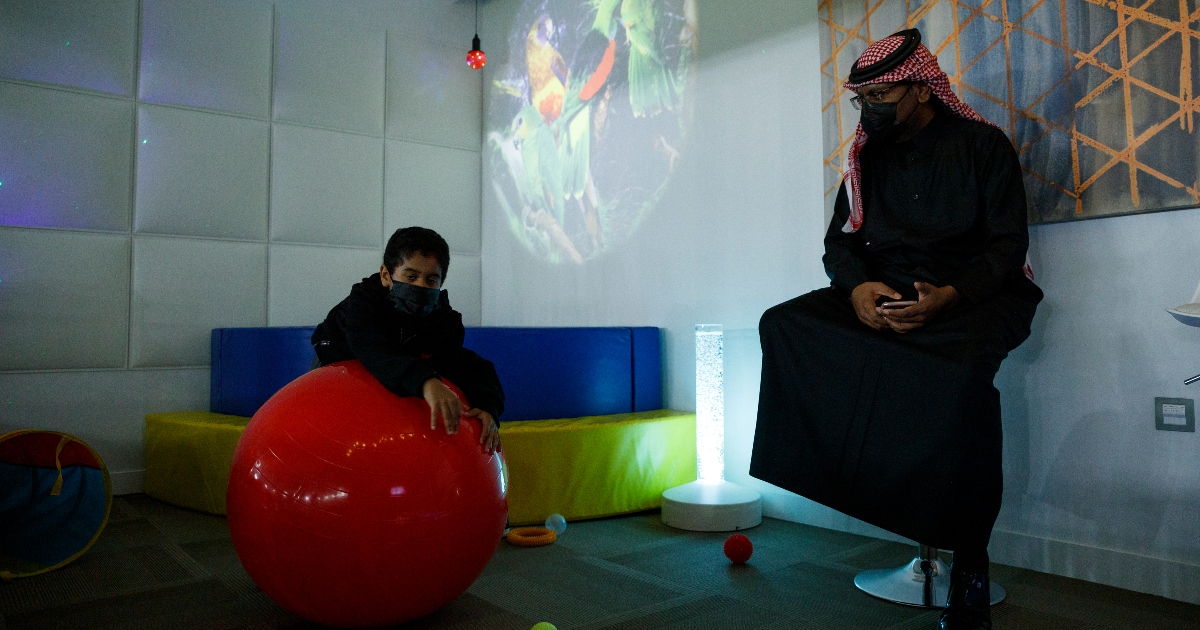

As the action unfolded during the FIFA Club World Cup Qatar 2020™ final between Bayern Munich and Tigres UANL at Education City Stadium, a much quieter space was made available for fans with autism in the upper bowls of the stadium.
The sensory room provided a safe space for fans with neurobehavioural needs to retreat to during the game and enjoy the match in a space that is fitted out with equipment designed to engage the senses with controlled lighting, interactive projections and different toys.
Sensory rooms are part of a wider initiative by the Supreme Committee for Delivery & Legacy (SC) to ensure that the FIFA World Cup Qatar 2022™ is accessible to all fans, regardless of their disability. Similar sensory rooms have been set up in the past at Al Janoub and Khalifa International stadiums, two venues which will host matches during Qatar 2022. These types of spaces are planned for stadiums when the World Cup comes to the Middle East and Arab world for the first time in less than two years.
“We want to make sure that the needs of all fans with disabilities are met during the tournament. This includes fans with autism who might prefer a quieter, more controlled environment to enjoy the game, and that is why we have partnered up with our stakeholders to provide sensory rooms at events in the lead up to the World Cup,” said Khaled Al Suwaidi, Stakeholder Relations Senior Manager at the SC.
The sensory room at Education City Stadium, a 40,000-seater venue that will host matches up to the quarter-final stage during Qatar 2022, was designed and executed by the SC in partnership with Qatar Foundation’s Awsaj and Renad academies, as well as the Qatar Rehabilitation Institute, three organisations that provide resources and services to people with Autism and their families in Qatar.
“By making a sensory room available at the FIFA Club World Cup final we are not only laying the groundwork for what will hopefully be one of the most accessible editions of the World Cup when we host it in 2022, but we are also working towards creating a legacy for the creation of more inclusive sporting venues beyond the tournament itself,” added Al Suwaidi.
For Hassan Al Qahtani, having the opportunity to bring his son Ali to the stadium provides him with an important opportunity to gradually build the necessary coping skills he needs to live an independent life in a busy society, all while taking in the action from a controlled environment that offers a clear sightline onto the field of play.
“Ali is just beginning to develop language and social skills, and having him experience a stadium at a final match like this should prove to be an invaluable experience for him, where he can take in the sights and sounds of a busy venue from a safe space that has been expertly designed to allow him to do so safely,” said Al Qahtani, who was one of a limited number of fans allowed into the sensory room as part of strict safety measures designed to limit the spread of COVID-19.
“Ultimately, I want to see Ali live as part of an inclusive society that provides the necessary spaces for him to enjoy all that Qatar has to offer. I believe that placing sensory rooms in World Cup stadiums will play a tremendous role in achieving this for my son and other people living with autism,” he added.
Fans with Autism and their families were able to access the sensory room prior to, during and after the match, allowing them extra time to acclimatise to their new surroundings and avoid crowds when entering and exiting the stadium. The fans, mostly children, were able to enjoy an interactive projector, soft toys and beanbags in a supervised environment while having the opportunity to step out into the stadium and enjoy the football from a row of dedicated seats.
The sensory room was deployed by modifying a skybox at the Education City Stadium to create a more inviting experience, which included modified soft lighting and soundproofed tactile furnishings on the wall. This created an inviting and stimulating internal atmosphere adjacent to the stands where users of the room could interact with the fans when at their own pace.

